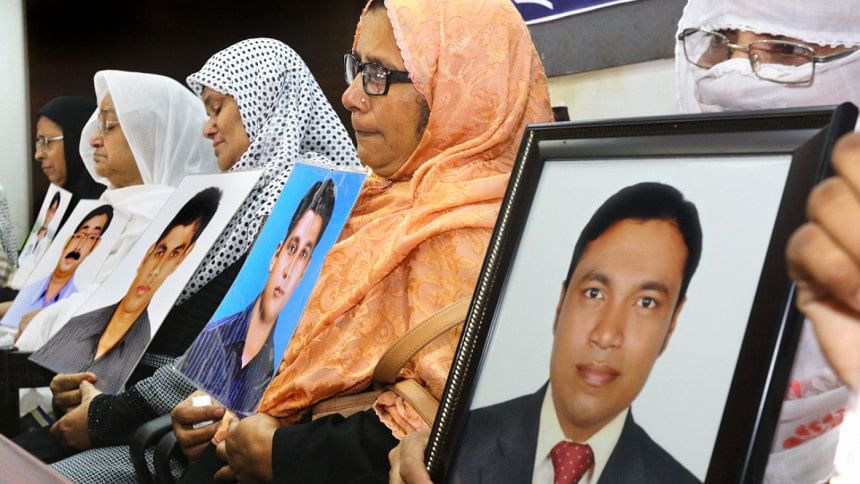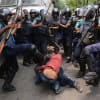The terrifying disappearing act

It is hard to imagine the anguish of not knowing whether a loved one gone missing is alive or dead, whether it will be a live human being or a corpse that will return. This is the kind of cruel, debilitating uncertainty that the families of Sajedul Islam Suman, Zahidul Karim Tanvir, Mazharul Islam Russel, Abdul Quader Bhuiyan Masum, Asaduzzaman Rana, Al Amin, Adnan Chowdhury and Kawsar Ahmed as well as many others go through every day. On December 4, families of these young men gathered together at the Press Club appealing to the government to intervene in bringing back these missing men who were all allegedly picked up by law enforcing agents, never to return. This was the second anniversary of their disappearance. According to Ain O Salish Kendra (ASK), last year, 88 people were reported as being abducted by law enforcers – 42 of them never returned and 23 came back as bodies. The year before the number of such missing persons was 68.
The relatives of the victims have gone to the offices of the law enforcement agencies only to be rebuffed as these agencies persistently deny having picked up any of the victims. Thus the most frightening aspect of these 'forced disappearances' is that the law enforcing agents involved cannot be held accountable because 'officially' such arrests or detentions have not taken place. At the most, they can file abduction cases though with very slim chances of them ever being solved or reaching the trial process.
The thought that citizens of a democratic, independent country can be picked up by law enforcement agents anytime, anywhere, without any kind of warrant and be whisked away into oblivion, is grossly contradictory. But unfortunately, these occurrences are becoming increasingly frequent in our country with no visible sign that the government is at all concerned about such blatant violations of human rights. Keeping with tradition, the politicisation of law enforcement agencies continues with full force thus distorting the role of the law enforcers allowing them to turn from protectors to predators. The result is the license for more such forced disappearances, creating an atmosphere of terror and mistrust for law enforcers in the public mind.
Such a bone-chilling scenario has an eerie similarity with the forced disappearances of ordinary citizens of many Latin American countries that were in the grips of military dictatorships. Chile's infamous, brutal regime of Augusto Pinochet from 1973 to 1990 comes to mind. During this military regime 28,000 people were tortured, 2,279 were executed, and 1,248 went missing. From September 11, 1973 to March 11, 1990, Chilean armed forces, the police and all those aligned with the military junta were involved in institutionalizing fear and terror in Chile. This included torture, sexual abuse, waterboarding and brutal beatings. The official number of deaths and forced disappearances is 3,065.
But wait, wasn't that a dictatorship where there was no such thing as civil liberties and no crime committed by the state could be proclaimed a violation of human rights? Wasn't Pinochet a ruthless general who led the coup d'état that overthrew an elected, popular, socialist government of Salvador Allende and put an end to civilian rule and hence civil liberties? So why the comparison with a democracy that guarantees, through its constitution, a citizen's right to know why s/he is being detained, the right to consult and be defended by a legal practititioner of her /his choice [Article 33 (1)] and his/her right to be produced before the nearest magistrate within twenty four hours of the arrest?
Bangladesh acceded to the International Covenant on Civil and Political Rights (ICCPR) that prohibits the grave violations of rights. According to Article 6 and 2 of the ICCPR, Bangladesh has the obligation to ensure the right to life of its people and to ensure prompt and effective reparation where violations occur. Our constitution explicitly states that "no person shall be deprived of life or personal liberty save in accordance with law" (Article 32) and also that "no action detrimental to the life, liberty, body, reputation or property of any person shall be taken except in accordance with law (Article 31)." There is therefore an overwhelming moral obligation for Bangladesh to protect and uphold such civil rights through its commitment to respect international covenants and its own constitution. The International Convention for the Protection of All persons from Enforced Disappearance (ICCPD), an international human rights instrument of the UN that aims to prevent forced disappearances, defines such abductions as crimes against humanity.
The tragic truth of our history is that though we have been able to shed ourselves the shackles of military dictatorship and all the violations of human rights that go along with such autocratic rule, we have not been able to free ourselves of the legacy of repression carried out by state agencies, a carryover from the days of the British rule. While we are nowhere near the gruesome levels of torture, murder and forced disappearances during Pinochet's rule or that of military dictatorships in many other Latin American countries, we cannot ignore the facts: individuals, many of them with perceived or real political leanings of the opposite camp, or just considered a threat by an influential, are being picked up by alleged law enforcing agents only to disappear without a trace. What is worse, law enforcers feel they have no legal obligation to investigate a missing persons report filed by relatives when the allegations are against their colleagues. The seven murder case of Narayanganj is a grotesque reminder of the terrifying level of human rights violations and the immunity enjoyed by rogue law enforcement agents. Forced disappearances are the most reprehensible crimes committed by state agencies. For a democratic government to allow such gross violations of rights of its citizens is unacceptable and severely damaging to its image.
The writer is Deputy Editor, Editorial and Opinion, The Daily Star.

 For all latest news, follow The Daily Star's Google News channel.
For all latest news, follow The Daily Star's Google News channel. 








Comments